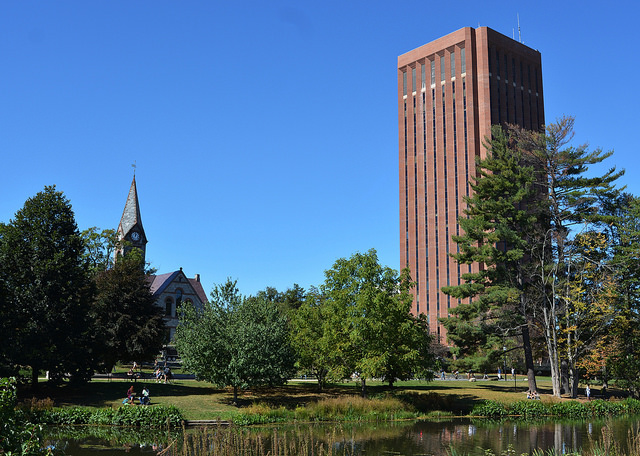Martha G. Newman, associate professor of history and religious studies at the University of Texas at Austin, gave a speech titled “Assigned Female at Death: Joseph of Schönau’s Disruption of Medieval Gender Binaries” on Thursday in Goodell Hall at the University of Massachusetts.
The talk stands as the 2018-19 Annual Distinguished Lecture within the UMass/Five College Graduate Program in History. Newman’s lecture delves into the life of 12th-century German monk Joseph of Schönau, who lived as a man, yet was assigned female at death. Newman’s work seeks to understand the possibility of non-binary genders within medieval monastic culture, and how gender fluidity was constrained during this time.
“The case of Joseph as transgender is filtered through Christian language and conceptions, in a way that might be surprising to modern readers who are more accustomed to religious hostility toward non-binary genders. But I hope you see as I continue that there are many possibilities within medieval Christianity to provide clear readings, but there’s also an effort to constrain [gender],” Newman said.
“To see Joseph as trans rather than a woman in disguise is to assume that his performance of masculinity was neither a cover or a choice but rather the realization of identity,” Newman explained. “In later accounts, other scholars more clearly stress that he was wearing male clothing as a means of safety while accompanying his father on a pilgrimage, and they portrayed him as displaying stereotypically female characteristics. Joseph’s own voice undermines the idea that Joseph was cross-dressing, because Joseph does not present himself as a disguised woman, but as a man.”
“Joseph recognized his differences, but attributed them to divine forces, not through his own choice. Joseph thought the monks would marvel at what the monks saw in him. The use of this preposition moves away from his body, and the appearance of his body and instead suggests the monks would find a gift from God within him,” Newman said. “The line defines his identity as a man was neither a choice, nor disguise, but rather a gift from God.”
Drew Degree, a senior accounting major, was inspired to go to the event to get extra credit for one of his classes, but also was interested in the subject matter.
“I’m not familiar with gender identity, or transgender issues, so I thought this would be interesting to learn more about it, and how it operated in medieval times,” Degree said.
Jaime Woolcock, a freshman double majoring in social thought and political economy and linguistics, explained her excitement about coming to the event.
“I’m non-binary, so the subject matter of the story was a big draw,” Woolcock said. “I also really like history and the convergence of history and gender, so I thought this would be really interesting to attend.”
Mark Roblee, a Ph.D. student and an instructor in the history department at the UMass, also expressed excitement about the speech.
“I’ve read some of Professor Newman’s works, and I’m also a historian of late antiquity. I’m interested in gender in the pre-modern world and was attracted to this event because of that too,” he said.
Jacqueline Hayes can be reached at [email protected].




















Amy • Oct 11, 2018 at 9:09 pm
I find this claim hard to believe; liberals have a tendency to lie and in some instances this type of ‘scholarship’ has proven fraudulent.